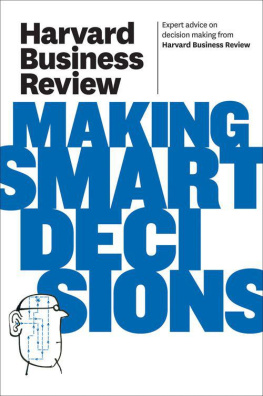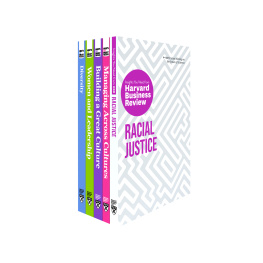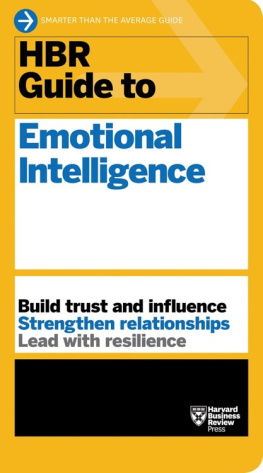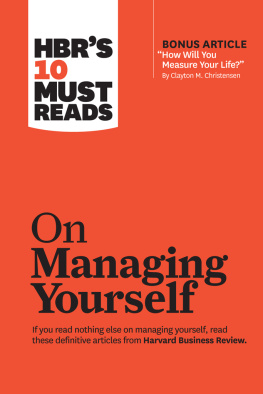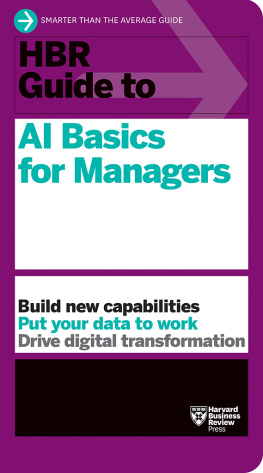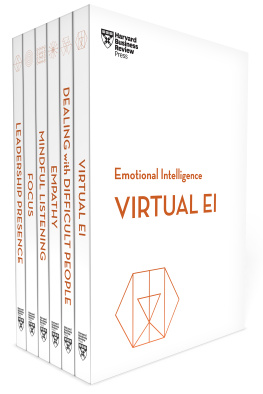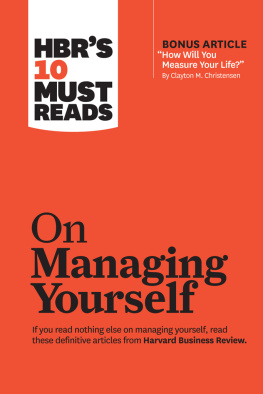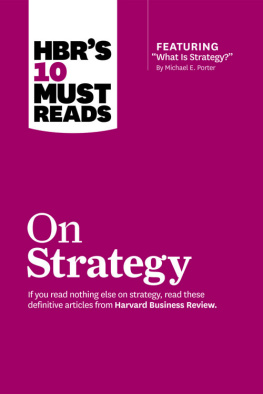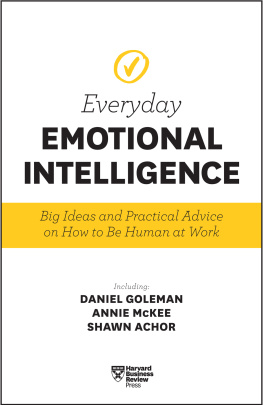Contents
Guide
Contents
Harvard Business Review Press
Boston, Massachusetts
Mindfulness
HBR EMOTIONAL INTELLIGENCE SERIES
HBR Emotional Intelligence Series
How to be human at work
The HBR Emotional Intelligence Series features smart, essential reading on the human side of professional life from the pages of Harvard Business Review.
Empathy
Happiness
Mindfulness
Resilience
Other books on emotional intelligence from Harvard Business Review:
HBRs 10 Must Reads on Emotional Intelligence
HBR Guide to Emotional Intelligence
Mindfulness
HBR EMOTIONAL INTELLIGENCE SERIES
Harvard Business Review Press
Boston, Massachusetts
HBR Press Quantity Sales Discounts
Harvard Business Review Press titles are available at significant quantity discounts when purchased in bulk for client gifts, sales promotions, and premiums. Special editions, including books with corporate logos, customized covers, and letters from the company printed in the front matter, as well as excerpts of existing books, can also be created in large quantities for special needs. For details and discount information for both print and ebook formats, contact .
Copyright 2017
Harvard Business School Publishing Corporation
All rights reserved
No part of this publication may be reproduced, stored in or introduced into a retrieval system, or transmitted, in any form, or by any means (electronic, mechanical, photocopying, recording, or otherwise), without the prior permission of the publisher. Requests for permission should be directed to , or mailed to Permissions, Harvard Business School Publishing, 60 Harvard Way, Boston, Massachusetts 02163.
The web addresses referenced in this book were live and correct at the time of the books publication but may be subject to change.
Library of Congress Cataloging-in-Publication Data
Title: Mindfulness.
Other titles: HBR emotional intelligence series.
Description: Boston, Massachusetts : Harvard Business Review Press, [2017] Series: HBR emotional intelligence series
Identifiers: LCCN 2016056277 | ISBN 9781633693197 (pbk. : alk. paper)
Subjects: LCSH: Mindfulness (Psychology). | Mindfulness-based cognitive therapy.
Classification: LCC BF637.M56 M56 2017 | DDC 152.4dc23 LC record available at https://lccn.loc.gov/2016056277
ISBN: 978-1-63369-319-7
eISBN: 978-1-63369-320-3
Contents
What it is and why its important.
An interview with Ellen Langer by Alison Beard
The science.
By Christina Congleton, Britta K. Hlzel, and Sara W. Lazar
Train your brain to focus better.
By Rasmus Hougaard and Jacqueline Carter
Use mindfulness to recharge.
By Daniel Goleman
Dont let your negative feelings own you.
By Susan David and Christina Congleton
Are you aware of your own incivilities?
By Dacher Keltner
When you just dont have the time.
By Maria Gonzalez
You may be missing the point.
By Charlotte Lieberman
Dont take it too far.
By David Brendel
Mindfulness
HBR EMOTIONAL INTELLIGENCE SERIES
1
Mindfulness in the Age of Complexity
An interview with Ellen Langer by Alison Beard
Over nearly four decades, Ellen Langers research on mindfulness has greatly influenced thinking across a range of fields, from behavioral economics to positive psychology. It reveals that by paying attention to whats going on around us, instead of operating on autopilot, we can reduce stress, unlock creativity, and boost performance. Her counter clockwise experiments, for example, demonstrated that elderly men could improve their health by simply acting as if it were 20 years earlier. In this interview with senior editor Alison Beard, Langer applies her thinking to leadership and management in an age of increasing chaos.
HBR:Lets start with the basics. What, exactly, is mindfulness? How do you define it?
Langer: Mindfulness is the process of actively noticing new things. When you do that, it puts you in the present. It makes you more sensitive to context and perspective. Its the essence of engagement. And its energy-begetting, not energy-consuming. The mistake most people make is to assume its stressful and exhaustingall this thinking. But whats stressful is all the mindless negative evaluations we make and the worry that well find problems and not be able to solve them.
We all seek stability. We want to hold things still, thinking that if we do, we can control them. But since everything is always changing, that doesnt work. Actually, it causes you to lose control.
Take work processes. When people say, This is the way to do it, thats not true. There are always many ways, and the way you choose should depend on the current context. You cant solve todays problems with yesterdays solutions. So when someone says, Learn this so its second nature, let a bell go off in your head, because that means mindlessness. The rules you were given were the rules that worked for the person who created them, and the more different you are from that person, the worse theyre going to work for you. When youre mindful, rules, routines, and goals guide you; they dont govern you.
What are some of the specific benefits of being more mindful, according to your research?
Better performance, for one. We did a study with symphony musicians, who, it turns out, are bored to death. Theyre playing the same pieces over and over again, and yet its a high-status job that they cant easily walk away from. So we had groups of them perform. Some were told to replicate a previous performance theyd likedthat is, to play pretty mindlessly. Others were told to make their individual performance new in subtle waysto play mindfully. Remember: This wasnt jazz, so the changes were very subtle indeed. But when we played recordings of the symphonies for people who knew nothing about the study, they overwhelmingly preferred the mindfully played pieces. So here we had a group performance where everybody was doing their own thing, and it was better. Theres this view that if you let every one do their own thing, chaos will reign. When people are doing their own thing in a rebellious way, yes, it might. But if every one is working in the same context and is fully present, theres no reason why you shouldnt get a superior coordinated performance.
There are many other advantages to mindfulness. Its easier to pay attention. You remember more of what youve done. Youre more creative. Youre able to take advantage of opportunities when they present themselves. You avert the danger not yet arisen. You like people better, and people like you better, because youre less evaluative. Youre more charismatic.
The idea of procrastination and regret can go away, because if you know why youre doing something, you dont take yourself to task for not doing something else. If youre fully present when you decide to prioritize this task or work at this firm or create this product or pursue this strategy, why would you regret it?
Ive been studying this for nearly 40 years, and for almost any measure, we find that mindfulness generates a more positive result. That makes sense when you realize its a superordinate variable. No matter what youre doingeating a sandwich, doing an interview, working on some gizmo, writing a reportyoure doing it mindfully or mindlessly. When its the former, it leaves an imprint on what you do. At the very highest levels of any field


